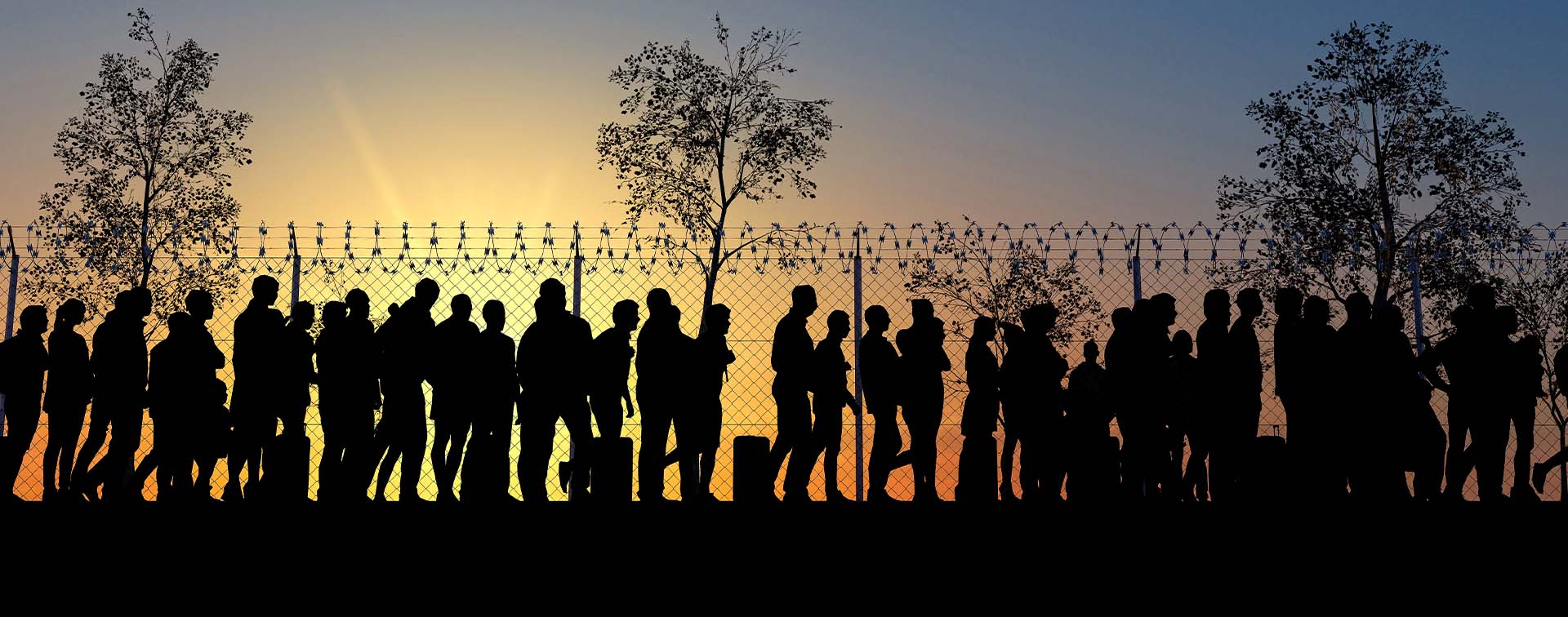
Bushra Zaidan is a Project Manager at the Andan Foundation.
Humanitarian crises often arise from armed conflicts, natural disasters, and political instability, profoundly impacting global migration. Wars such as those in Afghanistan, Gaza, South Sudan, Syria, and Ukraine have displaced millions and disrupted global stability, demanding an international response to support refugees globally.
According to the United Nations High Commissioner for Refugees (UNHCR), an estimated 117.3 million people worldwide have been forcibly displaced due to persecution, conflict, violence, human rights violations, and events seriously disturbing the established order. Natural disasters exacerbated by climate change, such as floods and earthquakes, have also displaced millions, especially in Africa and Asia. And political unrest and human rights abuses continue to drive migration, as seen in the Rohingya crisis which has forced hundreds of thousands to flee to Bangladesh. These crises underscore the urgent need for strong international frameworks ensuring safe passage for refugees.
The influx of refugees into host countries presents challenges and opportunities that reshape global mobility dynamics. Nations such as Jordan, Lebanon, and Türkiye, hosting Syrian refugees, struggle to provide essential services such as housing and healthcare, which impacts on local economies. Integrating refugees into communities does pose social challenges but equally can offer enrichment through diverse perspectives and skills, enhancing societal and economic dynamics. However, any sudden population increase strains infrastructure, exemplified by the Rohingya in Cox’s Bazar, Bangladesh overwhelming local resources and services.

Addressing these challenges requires robust international cooperation and comprehensive strategies. Organizations such as the UNHCR coordinate efforts to protect refugees and advocate for their rights, a crucial role amid rising nationalism and policy shifts which are limiting asylum access. International agreements outline refugee rights, guiding policies, while frameworks such as the Global Compact on Refugees seek improved responses and support for host nations. Financial aid from donor countries and multi-lateral organizations such as the World Bank supports infrastructure and services crucial for refugee integration and mobility.
Innovative initiatives such as the Andan Free Global City propose self-governed entities where refugees can rebuild their lives with access to education, healthcare, and employment. Such initiatives blend humanitarian goals with sustainable economic models, attracting investment while meeting refugee needs. Despite efforts, ongoing challenges such as underfunding and political resistance persist, necessitating sustained international cooperation and solutions addressing displacement’s root causes. Achieving lasting progress requires prioritizing refugee rights and well-being on a global scale.
Addressing humanitarian crises and managing refugee movements requires robust and coordinated international cooperation and comprehensive strategies to address global mobility challenges.
The UNHCR plays an important role in coordinating international efforts to protect and assist refugees, enhancing global mobility. It provides emergency relief, advocates for refugees' rights, and works towards long-term solutions such as resettlement and voluntary repatriation.
Non-governmental organizations also play a vital part in providing humanitarian aid and support services to refugees, facilitating their mobility. As well international agreements such as the 1951 Refugee Convention and its 1967 Protocol outline the rights of refugees and the obligations of states to protect them, shaping global mobility policies. Additionally, the Global Compact on Refugees adopted in 2018 aims to improve the international response to large movements of refugees and provide stronger support to host countries. These frameworks are essential for coordinating mobility strategies and ensuring safe and legal pathways for refugees.
Financial and technical assistance from donor countries is equally important for supporting refugees and host communities and creating the necessary infrastructure. Countries such as the USA, Germany, and Canada have been significant contributors to refugee assistance programs. Multi-lateral organizations such as the World Bank also provide funding for infrastructure projects and social services in host countries. Effective mobility solutions are key to managing the influx of refugees and ensuring their integration into host communities.
The Andan Foundation has proposed an innovative solution to the refugee crisis through its main project, the Andan Free Global City. This project aims to create autonomous, self-governed sub-national entities where refugees can live, work, and thrive rather than merely survive. The Andan Free Global City is designed to be a safe and prosperous environment for displaced individuals, offering them the opportunity to rebuild their lives and contribute economically.
The city is envisioned as a modern, sustainable urban center that provides residents with access to education, healthcare, and employment opportunities. It aims to be both a humanitarian and profitable initiative, attracting private investors by ensuring a return on investment, while addressing the growing needs of the global refugee population.
One of the major obstacles to progress is the underfunding of humanitarian programs, limiting their ability to provide essential support and mobility solutions. Additionally, political resistance fueled by rising nationalism and anti-immigrant sentiments in various countries hampers effective policies and support for refugees, potentially restricting their access to asylum and protection.
Addressing these challenges requires both financial support and sustainable solutions that tackle the root causes of displacement, including conflicts, political instability, and climate change. It’s crucial to foster the necessary international cooperation and political will to achieve lasting progress and ensure the well-being and rights of refugees are upheld globally.